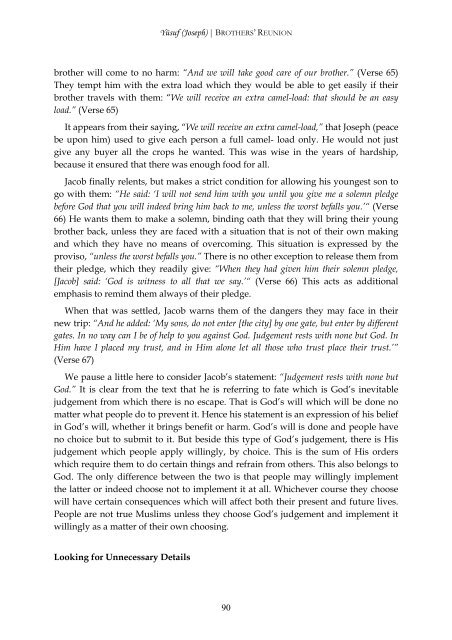Volume 10 Surah 12 - 15 - Enjoy Islam
Volume 10 Surah 12 - 15 - Enjoy Islam
Volume 10 Surah 12 - 15 - Enjoy Islam
Create successful ePaper yourself
Turn your PDF publications into a flip-book with our unique Google optimized e-Paper software.
Yūsuf (Joseph) | BROTHERS’ REUNION<br />
brother will come to no harm: “And we will take good care of our brother.” (Verse 65)<br />
They tempt him with the extra load which they would be able to get easily if their<br />
brother travels with them: “We will receive an extra camel-load: that should be an easy<br />
load.” (Verse 65)<br />
It appears from their saying, “We will receive an extra camel-load,” that Joseph (peace<br />
be upon him) used to give each person a full camel- load only. He would not just<br />
give any buyer all the crops he wanted. This was wise in the years of hardship,<br />
because it ensured that there was enough food for all.<br />
Jacob finally relents, but makes a strict condition for allowing his youngest son to<br />
go with them: “He said: ‘I will not send him with you until you give me a solemn pledge<br />
before God that you will indeed bring him back to me, unless the worst befalls you.’“ (Verse<br />
66) He wants them to make a solemn, binding oath that they will bring their young<br />
brother back, unless they are faced with a situation that is not of their own making<br />
and which they have no means of overcoming. This situation is expressed by the<br />
proviso, “unless the worst befalls you.” There is no other exception to release them from<br />
their pledge, which they readily give: “When they had given him their solemn pledge,<br />
[Jacob] said: ‘God is witness to all that we say.’“ (Verse 66) This acts as additional<br />
emphasis to remind them always of their pledge.<br />
When that was settled, Jacob warns them of the dangers they may face in their<br />
new trip: “And he added: ‘My sons, do not enter [the city] by one gate, but enter by different<br />
gates. In no way can I be of help to you against God. Judgement rests with none but God. In<br />
Him have I placed my trust, and in Him alone let all those who trust place their trust.’”<br />
(Verse 67)<br />
We pause a little here to consider Jacob’s statement: “Judgement rests with none but<br />
God.” It is clear from the text that he is referring to fate which is God’s inevitable<br />
judgement from which there is no escape. That is God’s will which will be done no<br />
matter what people do to prevent it. Hence his statement is an expression of his belief<br />
in God’s will, whether it brings benefit or harm. God’s will is done and people have<br />
no choice but to submit to it. But beside this type of God’s judgement, there is His<br />
judgement which people apply willingly, by choice. This is the sum of His orders<br />
which require them to do certain things and refrain from others. This also belongs to<br />
God. The only difference between the two is that people may willingly implement<br />
the latter or indeed choose not to implement it at all. Whichever course they choose<br />
will have certain consequences which will affect both their present and future lives.<br />
People are not true Muslims unless they choose God’s judgement and implement it<br />
willingly as a matter of their own choosing.<br />
Looking for Unnecessary Details<br />
90

















